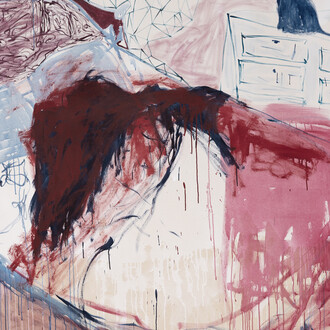‘Milella uses the camera like a spyglass through which to peer at the past. This is the predominant time in his images, which investigate the rooting of the present in history.’ - Francesco Zanot
Domingo Milella’s forthcoming solo exhibition at Grimaldi Gavin will feature recent images of important ancient sites in Turkey shown alongside ‘Index’, a sequence of 30 photographs providing an overview to the themes and subjects of Milella’s work over the past ten years.
The three most recent works in the exhibition, Topada Inscriptions, Fraktin Relief, and Arsemia, (Turkey, 2013) develop Milella’s interest in language and its passage through time. The Topada inscriptions (8th century BC) and the Fraktin relief (13th century BC) were created by the Hittite people and feature Luwian hieroglyphs. The work Arsemia features an inscription in ancient Greek, thought to date from 50 years BC. All three works show languages largely undecipherable to the contemporary viewer, their meanings lost through time whilst their visual and physical imprint on the landscape remains.
The focus of the exhibition is ‘Index’, a compendium of 30 images, is a visual sequence of the themes and subjects that dominate Milella’s work and form a retrospective of his practice. Starting in his hometown of Bari, Southern Italy Milella’s photographic journey has taken him to Mexico City, Cairo, Ankara, Anatolia, Sicily, Tunisia and Mesopotamia. His subjects have been cities and their borders, cemeteries and villages, caves and homes, tombs and hieroglyphs – signs of man’s presence on earth. Milella’s interest lies in the overlap between civilisation and nature and how landscape and architecture are invested with individual and collective memory.
Turning his back on technology, Milella conducts his research into new sites using traditional topographic maps and archeological data to lead him to the isolated remains of ancient cultures. On this last trip to Turkey in 2013 he concentrated on Hittite monuments, inscriptions and Hellenistic tombs, located in places of great, even poetic beauty. For Milella, the creative choices of this long dead culture are re-ignited back into life by his engagement with them. His images of these encounters do not seek to understand the meaning of the inscriptions and reliefs but instead to observe their place in the landscape and their mutability, surviving for 3000 years in silent expression. In contrast with the ancient scripts he captures, Milella’s own writing (the word photography translates in the Greek into ‘writing with light’) is transient and questioning of photography’s ability to document such objects for posterity.
The monograph, Domingo Milella, featuring an afterword by photography critic and curator, Francesco Zanot, will be published by Steidl to coincide with the exhibition.
Domingo Milella was born in 1981 in Bari, Italy and lives between there and London. His work is informed by his upbringing in Bari and his extensive travels through both the ancient and the new world. Milella graduated in Photography from the School of Visual Arts, New York in 2005, where he was taught by Stephen Shore. Since graduation Milella has been mentored by Massimo Vitali and Thomas Struth. Since graduation Milella has worked with Massimo Vitali and Thomas Struth has been an influential mentor.
His work has been exhibited in numerous international exhibitions including FOAM, Amsterdam (2008), Les Recontres d’Arles (2011) and is currently on display as part of the Margulies Collection at the Warehouse, Miami and in the exhibition ‘Common Ground: Earth, Water, Air’ and at Borusan Contemporary Museum in Istanbul.



















